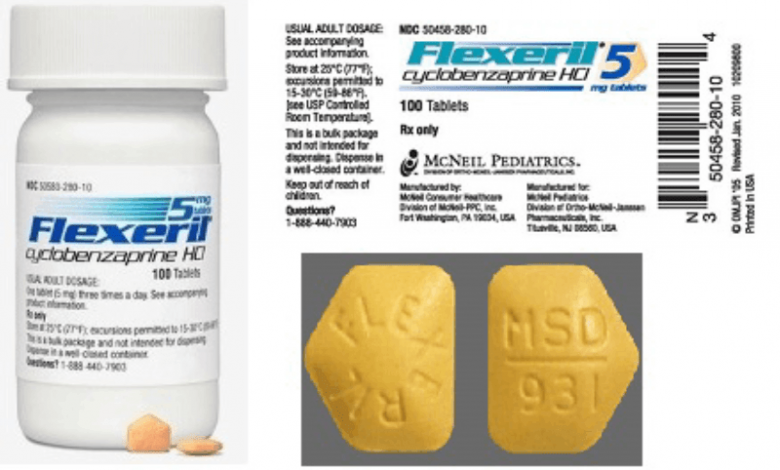Why Was Flexeril Discontinued?

Flexeril is a brand of cyclobenzaprine, a prescription medication used with rest, physical therapy, and other measures to relax muscles and relieve pain and discomfort caused by strains, sprains, and other muscle injuries. Cyclobenzaprine is in a class of medications called skeletal muscle relaxants. It works by acting in the brain and nervous system to allow the muscles to relax.
Cyclobenzaprine was first synthesized in 1961 and has been available for human use since 1977. It was initially studied for use as an antidepressant given its structural similarity to tricyclic antidepressants, it differs from Amitriptyline by only a single double bond.
Recommendations generally limit the use of drugs like Flexeril to a maximum of three weeks, since they have not been shown to work for muscle spasms beyond that duration, and they can cause serious side effects including falls, fractures, vehicle crashes, abuse, dependence, and overdose.
Why Was Flexeril Discontinued?
Brand name Flexeril has been taken off the market in the US by its manufacturer (Merck & Co. Inc) for business reasons but generic versions of the drug and brand names like Amrix and Fexmid which also contain cyclobenzaprine are still available in the market.
Cyclobenzaprine was approved for medical use in the United States in 1977. In 2019, it was the 45th most commonly prescribed medication in the United States, with more than 15 million prescriptions. It is not available in the United Kingdom as of 2012.
Misusing Flexeril can be extremely dangerous and, in some instances, life-threatening. While Flexeril is intended for short-term use, muscle relaxants are often used chronically and prescribed to populations potentially at risk of experiencing an overdose or other adverse reactions.
What should I discuss with my healthcare provider before taking cyclobenzaprine?
You should not use cyclobenzaprine if you are allergic to it, or if you have:
• a thyroid disorder;
• heart block, heart rhythm disorder, congestive heart failure; or
• if you have recently had a heart attack.
Cyclobenzaprine is not approved for use by anyone younger than 15 years old.
Do not use cyclobenzaprine if you have taken an MAO inhibitor in the past 14 days. A dangerous drug interaction could occur. MAO inhibitors include isocarboxazid, linezolid, phenelzine, rasagiline, selegiline, and tranylcypromine.
Some medicines can interact with cyclobenzaprine and cause a serious condition called serotonin syndrome. Be sure your doctor knows if you also take stimulant medicine, opioid medicine, herbal products, or medicine for depression, mental illness, Parkinson’s disease, migraine headaches, serious infections, or prevention of nausea and vomiting. Ask your doctor before making any changes in how or when you take your medications.
Tell your doctor if you have ever had:
• liver disease;
• glaucoma;
• enlarged prostate; or
• problems with urination.
It is not known whether this medicine will harm an unborn baby. Tell your doctor if you are pregnant or plan to become pregnant.
It may not be safe to breastfeed while using this medicine. Ask your doctor about any risks.
Older adults may be more sensitive to the effects of this medicine.
How should cyclobenzaprine be used?
Cyclobenzaprine comes as a tablet and an extended-release capsule to take by mouth. The tablet is usually taken with or without food three times a day. The extended-release capsule is usually taken with or without food once a day. Do not take this drug for more than 3 weeks without talking to your doctor. Follow the directions on your prescription label carefully, and ask your doctor or pharmacist to explain any part you do not understand. Take cyclobenzaprine exactly as directed. Do not take more or less of it or take it more often than prescribed by your doctor.
Swallow the extended-release capsules whole; do not chew or crush them.
If you are not able to swallow the extended-release capsule whole, mix the contents of the capsule with applesauce. Eat the mixture right away and swallow without chewing. After you eat the mixture, take a drink, and swish and swallow to make sure that you have received all the medication.
Cyclobenzaprine side effects
Cyclobenzaprine oral tablet may cause drowsiness and dizziness. This is more likely to happen in the few hours after you take it. It can also have other side effects.
More common side effects
The more common side effects of cyclobenzaprine can include:
• dry mouth
• dizziness
• fatigue
• constipation
• drowsiness
• nausea
• heartburn
If these effects are mild, they may go away within a few days or a couple of weeks. If they’re more severe or don’t go away, talk to your doctor or pharmacist.
Serious side effects
Call your doctor right away if you have serious side effects. Call 911 if your symptoms feel life-threatening or if you think you’re having a medical emergency. Serious side effects and their symptoms can include the following:
• Heart problems. Symptoms can include:
o fainting
o heart palpitations (fast or irregular heartbeat)
o confusion
o trouble speaking or understanding
o loss of control or numbness in your face, arms, or legs
o trouble seeing in one or both eyes
• Serotonin syndrome. Symptoms can include:
o agitation (a feeling of aggravation or restlessness)
o hallucinations (hearing or seeing something that isn’t there)
o seizures
o nausea
If you experience a serious side effect, you or your doctor may send a report to the Food and Drug Administration’s (FDA) MedWatch Adverse Event Reporting program online (http://www.fda.gov/Safety/MedWatch) or by phone (1-800-332-1088).





